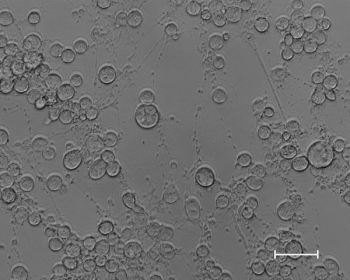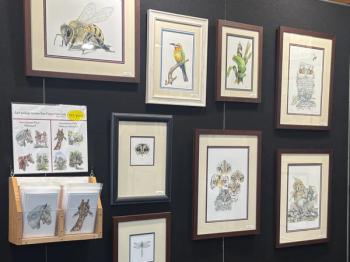
Closing words from the Zoetis Reference Labs team
Final thoughts from the panel on how Zoetis Reference Laboratories differentiates itself from the competition
Episodes in this series

Content sponsored by Zoetis
Adam Christman, DVM, MBA: Well, I had to bring our panelists back up. So we can have some final closing remarks, too. So Dr. Grimes, any final closing remarks, comments?
Carolyn Grimes, DVM, DACVP (Clinical Pathology): Yeah, I want to say I love how well it the cases that came up today demonstrate this concept of the right test being chosen at the right time for the right patient, that concept of diagnostic stewardship. And anyone who's talked to me knows that I really believe that being a GP veterinarian is one of the hardest jobs in the world. What other doctor is expected to in the course of a single day, manage an unregulated diabetic, diagnose glaucoma, do a wellness visit on a one year old puppy, then, you know, do a splenectomy and oh, by the way, a hit by car just came in, not to mention the the emotional roles and business roles that they're expected to play. Our medical leadership team, we are passionate about diagnostic medicine, laboratory medicine, we study it, we know it, we care about it. And we are experts in it. And we want to help veterinarians by partnering with them to be...provide the best care they possibly can. I just hope that clinicians understand that we want to partner with you. To help you choose the right test to help you interpret the right test. Nobody expects you to remember everything that you learned in vet school, we have specialists to support that. And we want to provide that for you. And there's just so much more information you can get out of your diagnostic lab by picking up the phone calling talking to a specialist and letting us letting us help help you and the other thing that I want to mention is that A lot of veterinarians aren't aware that human laboratory medicine that the quality standards are federally regulated. What those standards are, and how they're met is, is regulated by accrediting bodies, such as the College of American Pathologists. in veterinary medicine, quality standards are not mandatory, they're not regulated. It's up to each diagnostic laboratory to decide what quality standards are going to uphold. The ASPCP, the American Society for Veterinary Clinical Pathologists, is starting to develop the standards on these guidelines for quality standards in laboratory medicine. But these set of standards is, in its essence, its beginnings. So they're not nearly as comprehensive as as they are for human medicine. Where the ASPCP has determined guidelines for quality standards, we follow those and where those standards don't yet exist in quality medicine. We model our quality management system after the College of American Pathologists, which is the the human, the human gold standard.
Adam Christman, DVM, MBA: Oh, wow. Fantastic. Thank you for sharing all that. It's wonderful. Dr. Brent? Yeah, any final comment you'd like to share?
Laura Brandt, DVM, MS, DACVP (Clinical Pathology): Yeah, I just want to remind folks that when they're thinking about their CBC, what type of CBC is appropriate for what patient? If you have a sick, elderly patient, you really need to have that blood smear examined. I think it's great for all patients, but especially in those specific populations. So definitely opt for that comprehensive CBC that evaluation. And if you're inclined to please, please, please also make your own blood smear and send that along with your EDTA sample so that we can get the freshest possible sample to look at assess some of these morphological changes.
Adam Christman, DVM, MBA: That beautiful feathered edge.
Laura Brandt, DVM, MS, DACVP (Clinical Pathology): Oh, my gosh.
Adam Christman, DVM, MBA: Beautiful feather edge too. Yes, Dr. Rankin.
Shelley Rankin, PhD: So I'd like to just follow up on what Dr. Grimes said about quality. The Veterinary Antimicrobial Susceptibility Testing Committee for the Clinical Laboratory Standards Institute have put together a really great document. It's called vet or name. And it is available for veterinarians to purchase so that they can understand how we do what we do in a clinical microbiology lab. Or you can just send your specimens to the clinical microbiology lab as a way as reference labs, and we can take care of all of that hard work for you.
Adam Christman, DVM, MBA: Oh, nice. Wow. Thank you. Thank you so much. Wonderful. And finally, Dr. Gailbreath.
Katherine Gailbreath, DVM, PhD, DACVP: Yeah, I think my take home message would be to get to know your pathologist and try and build that kind of community and stewardship relationship that we've been talking about. Pathologists like to get to know clinicians and we like to talk to the same clinicians more than once. And so please get to know somebody that you'd like to send stuff to that applies to dermatopathology and any kind of pathology or any kind of cytology, you know. And ask. The other thing about that is, is when you have that relationship, it's a lot easier to provide your pathologist with the information that they need there, they're going to be able to get in touch with you easier and find out the questions and answer the questions that they might have. So that that relationship building is a huge thing for diagnostics in general, but about for pathology.
Adam Christman, DVM, MBA: It's all about that collaboration because you know, teamwork makes the dream work. Well, we want to thank our friends at Zoetis and also our esteemed colleagues here for the sharing their insight with their great cases and feedback. This has been fantastic. Thank you so much for tuning in. And we'll see you right here next time here at dvm360.
Newsletter
From exam room tips to practice management insights, get trusted veterinary news delivered straight to your inbox—subscribe to dvm360.















